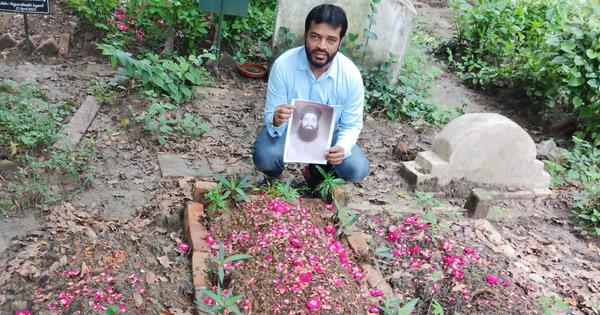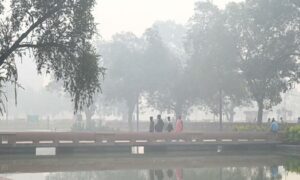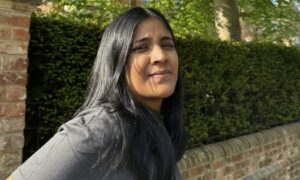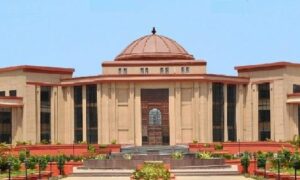
On the evening of July 20, I was at home having dinner with my brother-in-law, Sajid Magroob Ansari. He was one of the accused in the 7/11 Mumbai train blasts case – someone who has already spent 19 years in prison and was out on a 40-day parole for the first time after nearly two decades. As we ate together, a message suddenly flashed on my feed: the long-reserved judgment in the case, pending since January this year, would be delivered the next day.
Thirteen of us had been accused, among other charges, of terrorism, waging war against the nation and planting bombs in seven suburban trains in Mumbai on July 11, 2006. The explosions killed 189 people and injured 824.
In 2015, after nine years of being wrongfully imprisoned, I was the only one of the men accused in the case to be acquitted. When I was released, I decided that I would dedicate my life to ensuring the release of all the innocent people still implicated in the case.
On that July evening, as we waited for the verdict, hope and fear collided inside me. I did not know how to react – whether to expect relief or brace for yet another round of despair. I went to sleep with prayers on my lips, wishing that the judgment would finally end our 19 years of unending grief and bring closure to lives thrown into chaos.
But as I wrestled with these thoughts, one name kept haunting me: Kamal Ansari. I had spent nine years with him behind the bars. He had been sentenced to death, and in a tragic sense that sentence was carried out – not by the gallows but by the grinding slowness of the judicial process.
Kamal had died in Nagpur Central Jail in 2021 as the trial was still underway. He had spent 16 years behind bars.
When the High Court delivered its verdict, it was scathing about the prosecution’s case. It declared that the evidence presented by the Mumbai Police’s Anti-Terrorism Squad was unreliable. The entire case, the court said, was built on three pillars – eyewitness accounts, recoveries of explosives and confessional statements – all of which had crumbled under legal scrutiny.
This judgment, historic as it may be, had no bearing on Kamal Ansari, except that his name was cleared posthumously, after 19 years of relentless struggle by the lawyers of the Jamiat Ulema-e-Hind, by his family and friends.
Relief washed over me – but it was laced with anguish. How could a judicial system, in which we had invested our deepest faith, take nearly two decades to recognise the innocence of a man, even though that was clear from the very first day?
I believe we should never have been dragged into this case at all – and yet, like Kamal, we all lost the best years of our lives to prison simply for being a Muslim in India at the height of the so-called war on terror.
‘Barbaric and inhuman torture’: Bombay High Court acquits all 12 in 2006 Mumbai train blasts.https://t.co/ee7I1iB2ua
The ATS relied on confessions extracted through inhuman methods and evidence the court called unreliable and inadmissible.
Vineet Bhalla reports
— Scroll.in (@scroll_in) July 28, 2025
Kamal’s posthumous acquittal was unique – rarely do courts extend the benefit of judgment to the dead. For that, I remain grateful to the bench of Justice Anil Kilor and Justice Shyam Chandak. I have been reflecting on this since the judgment: Kamal was not alone. I thought of Father Stan Swamy in the Elgar Parishad case and Pando Narote, accused of having links with Maoists, who both died awaiting trial, denied even the dignity of medical care; and of countless prisoners I had seen die inside because of sheer neglect.
The state that cages you also quietly kills you. And when, after two decades, the court finally declares you innocent, what then? Can the state reverse a death? Can it restore the stolen decades of a life?
When the judgment came, I could not share in the celebrations without unease. The media kept repeating that “12 individuals have been acquitted” with only a passing mention that one had died during the trial. To them, it was just a number. But to us, Kamal was not a number – he was a friend. To his mother, he was a son; to his wife, a husband; to his children, a father. Reducing his life to a fleeting line in news coverage erases the enormity of what was lost.
The fact that a man had to wait until after his death to be declared innocent exposes the brutal trajectory of justice in this country – justice that comes too late is no justice at all. I remembered how Kamal and I had once walked together to court, shared hope in our highs and despair in our lows. Yet, when others returned to their homes after the acquittal, his family had only the solace of imagining that somewhere, somehow, Kamal heard the judgment and found a measure of peace in the recognition of his innocence.
A man who should have returned home after 19 years of wrongful imprisonment never did. A wife who had spent those same years waiting for her husband’s return was left waiting forever. Why? Because somewhere, officials needed to protect their careers; a state needed scapegoats to prove it was “working”; a judiciary needed convictions to preserve the façade of justice and the rule of law.
In this cruel machine, lives were destroyed – not just one life, but families, entire futures. And yet, no one seems disturbed. The nation moves on, as if nothing irreversible has been stolen.
On the day of the judgment, I resolved that Kamal’s absence could not be reduced to a passing footnote. I went to Nagpur, stood before his grave and read out the verdict that had acquitted him. It was a moment heavy with contradictions: here lay a man who had spent the years of his life condemned as guilty, and now – six feet under – the Bombay High Court declared him innocent. For him, the judgment meant nothing; it was a piece of paper carried too late.
As I stood there, I thought of the miracle of those who had somehow survived 19 years of incarceration, while so many others had not – men who died of neglect, untreated illness or the crushing despair of false charges.
At Kamal’s grave, words failed me. I could only pray, as a believing Muslim, that his soul would be rewarded, for he was both a martyr and a victim of a system that thrives on scapegoats and broken lives. For his family, for his community, for all of us, Kamal Ansari’s story is a reminder that justice delayed is not just justice denied, it is justice buried.
The grave of Kamal Ansari is not just the resting place of a wronged man – it is a permanent blot on India’s judicial system, its investigative agencies, and the politics of scapegoating that flourished in the name of the “war on terror”. His grave stands as both a symbol of resistance and a reminder of oppression, of how shoddy investigations and manufactured cases destroyed lives to satisfy the state’s hunger for convictions.
Kamal’s grave, silent yet unyielding, tells a story louder than any judgment: that justice delayed is not only justice denied, but justice buried.
How many more Kamals must die before the state recognises that delay itself is a form of violence? What compensation can ever account for a life lost, for years stolen, for families shattered? Our act of reading the judgment at Kamal’s grave was not just a gesture of remembrance – it was a symbolic act of protest against an inhuman framework that sustains itself by erasing lives in the name of justice.
The only true tribute to Kamal, and to countless others who have perished in silence, is to demand urgent accountability and a thorough revamping of India’s judicial system. Without such reforms, Kamal will remain only a name to mourn, rather than the beginning of a struggle to ensure that no more innocents are buried under the weight of false charges and delayed trials.
Real justice lies not in posthumous acquittals, but in building a movement for judicial reforms that prevents such injustices from ever recurring.
During his nine years in prison, Abdul Wahid Shaikh studied law. He now serves as the general secretary of the Innocence Network, a pan-India collective of lawyers and activists challenging wrongful terror prosecutions.
📰 Crime Today News is proudly sponsored by DRYFRUIT & CO – A Brand by eFabby Global LLC
Design & Developed by Yes Mom Hosting






